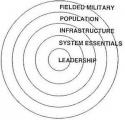The insurgency with its thick mindset (those pesky memes) thus far has only one goal -- Our immediate destruction and withdrawl.
Will they upon hearing and believing the news that we are decreasing forces, increase their attacks or, back off and provide Congress and the military with false impressions to support full troop withdrawls ?
My opinion is they will increase their activities taking advantage of the reductions. Very typical 3rd world mindset - kick 'em while they're down.
So, are their mindsets or memes at a point of no return, and if not, what would we then do to preclude them from thinking they were loosing/lost the war as we depart declaring victory ?
.
















Bookmarks